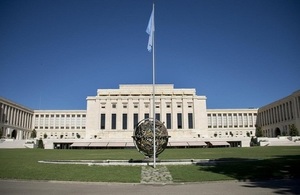Interactive dialogue with the UN Special Rapporteur on Belarus, 23 June 2015
The UK delivered a statement during the interactive dialogue with the UN Special Rapporteur on Belarus. at the Human Rights Council, Geneva.

The Human Rights Council takes at the Palais des Nations in Geneva. Credit: UN Photo/Jean-Marc Ferre
Thank you, Mr President.
Mr Special Rapporteur Haraszti,
The UK thanks you for your efforts – in difficult circumstances – to produce reports on the human rights situation in Belarus, and to maintain international pressure on Belarus to cease human rights violations.
The UK strongly supports the extension of your mandate. Your reports are a vital, independent source of information. It is regrettable that the Government of Belarus continues to refuse you access to the country.
Mr Haraszti,
The human rights situation in Belarus remains a cause for serious concern. Your reports underline the systemic and systematic nature of human rights violations, across a range of areas. There is a widespread use of administrative and preventative arrests to limit freedom of speech and stifle civil society. You highlight the plight of prisoners in Belarus, and politically motivated imprisonments. The UK urges Belarus to release and rehabilitate all political prisoners.
The UK is seriously concerned about the restrictions placed on the rights to freedom of expression and of association, and on the freedom of the media. There is oppression of journalists. Restrictive laws lead to arbitrary decisions preventing registration of civil society organisations. These laws stifle the development of civil society.
The rights to freedom of expression and of association are essential for free and fair elections. In this presidential election year, the UK calls upon the Belarusian authorities to take measures to ensure free and fair elections allowing transparency, and a full role for opposition members.
The founding of a working group on capital punishment was a positive move, but after two years there have been no results. We urge the Government of Belarus to establish a moratorium on the death penalty, with a view to its permanent abolition.
Mr Haraszti,
Given the restrictions placed on freedom of association and expression, what more can the international community do to help organisations in Belarus work to create a vibrant civil society?
Thank you.